Research Impact Resources
What are Broader Impacts?
Broader Impacts are one of the two merit review criteria for proposals submitted to the National Science Foundation, the other being Intellectual Merit:
- Broader Impacts
The potential to benefit society and contribute to the achievement of specific, desired societal outcomes.
- Intellectual Merit
The potential to advance knowledge and understanding within its own field or across different fields.
Creating a Broader Impacts Plan
Work with researchers and innovators in undergraduate STEM education to learn strategies for effectively sharing their work with others
POGIL uses guided inquiry – a learning cycle of exploration, concept invention and application as the basis for many of the carefully designed materials students use to construct new knowledge
Professional Development Opportunities
Education and Outreach Expo
February 24, 2026An interactive event for attendee researchers to network with campus program representatives ready to collaborate with them on the education, outreach, and broader impacts aspects of their research proposals
Full Calendar of Events
Education and Outreach Resource Groups at Texas A&M

Aggie ACHIEVE
Over 1 million school-age persons in the United States have Intellectual or Developmental Disabilities (IDD).
Many young adults with IDD Aspire to have a life with a good job, good friends and independent living, just like their peers. Aggie ACHIEVE can help them reach these goals.
What is Aggie ACHIEVE?
Aggie ACHIEVE, is a comprehensive transition program for young adults with IDD who have exited high school. The program customizes coursework, internships and extracurriculars with each student’s academic and employment goals while providing them with a college experience, including residence life, and the opportunity to form lifelong relationships through campus activities.
The first two years of Aggie ACHIEVE focus on college life, including an on-campus internship during the first spring semester and weekly seminars on independent living, self-determination and inclusive career awareness. The final two years focus on career development and specialization, including off-campus internships matching each student’s field of expertise.
Program Goals
- Create a four-year postsecondary pathway for students with IDD in Texas to prepare for competitive employment and independent living.
- Provide students with an immersive college experience that includes access to all the services and support Aggie students receive.
- Expand the opportunities and experiences of students already on campus by providing them with opportunities to improve their understanding of other students.
Funding
Aggie ACHIEVE is supported exclusively through student fees and private funding.
Fees: $20,500 – Description: Aggie ACHIEVE and Texas A&M fees
Fees: $10,400 – Housing and meal plan* (rates vary by year)
*Aggie ACHIEVE and Texas A&M Residence Life work together to create a comprehensive living and learning community on campus. ACHIEVE students have a community of peers, convenient access to classes and activites and support form resident mentors.
ACHIEVEMates
ACHEIVEMates are undergraduate Texas A&M students from across the disciplines who volunteer to partner one-on-one with ACHIEVE students, facilitating their involvement within the campus community.
Aggie ACHIEVE exists as an accommodation to assist college students with Intellectual and Developmental Disabilities to successfully attend college. Aggie ACHIEVE supports both student and faculty by bridging the communication between the student and the professor. Prior to the start of the semester, the student and faculty along with ACHIEVE staff participate in an ILA (Individual Learning Agreement) meeting. During this meeting, faculty provide the student and program staff with the course information, expectations, etc. The student will provide information regarding supports and accommodations he/she may need. Aggie ACHIEVE provides Study Hall support (minimum of 4 hours per week) for each student to be successful in their courses. Faculty are not required to change your teaching style or provide one-on-one instruction. ACHIEVE students can receive additional supports from Disability Resources including note taker assistance, extended time on assignments/tests, alternate assignment, and testing options (ACHIEVE students can submit power point presentations or have shortened tests). The accommodations are discussed as a team during the ILA. Each member of the ILA meeting is provided with a copy of the ILA agreement. Additional faculty support includes open communication with the program if there is an issue and or additional supports are needed. At the end of the semester, faculty completes an end-of-semester ILA to provide feedback on the student’s performance, their experience teaching and ACHIEVE student and if the faculty would like to continue the partnership with Aggie ACHIEVE. Research Support: Research plays an integral role in immersive education for students with disabilities. ACHIEVE students have participated in the research as a research participant as well as a project research team member. Aggie ACHIEVE can support the faculty and student by providing letters of support and or collaboration, a biosketch, disability resource accommodations for the student, Job Coach to support the student in their research assignments, open communication and overall general support.
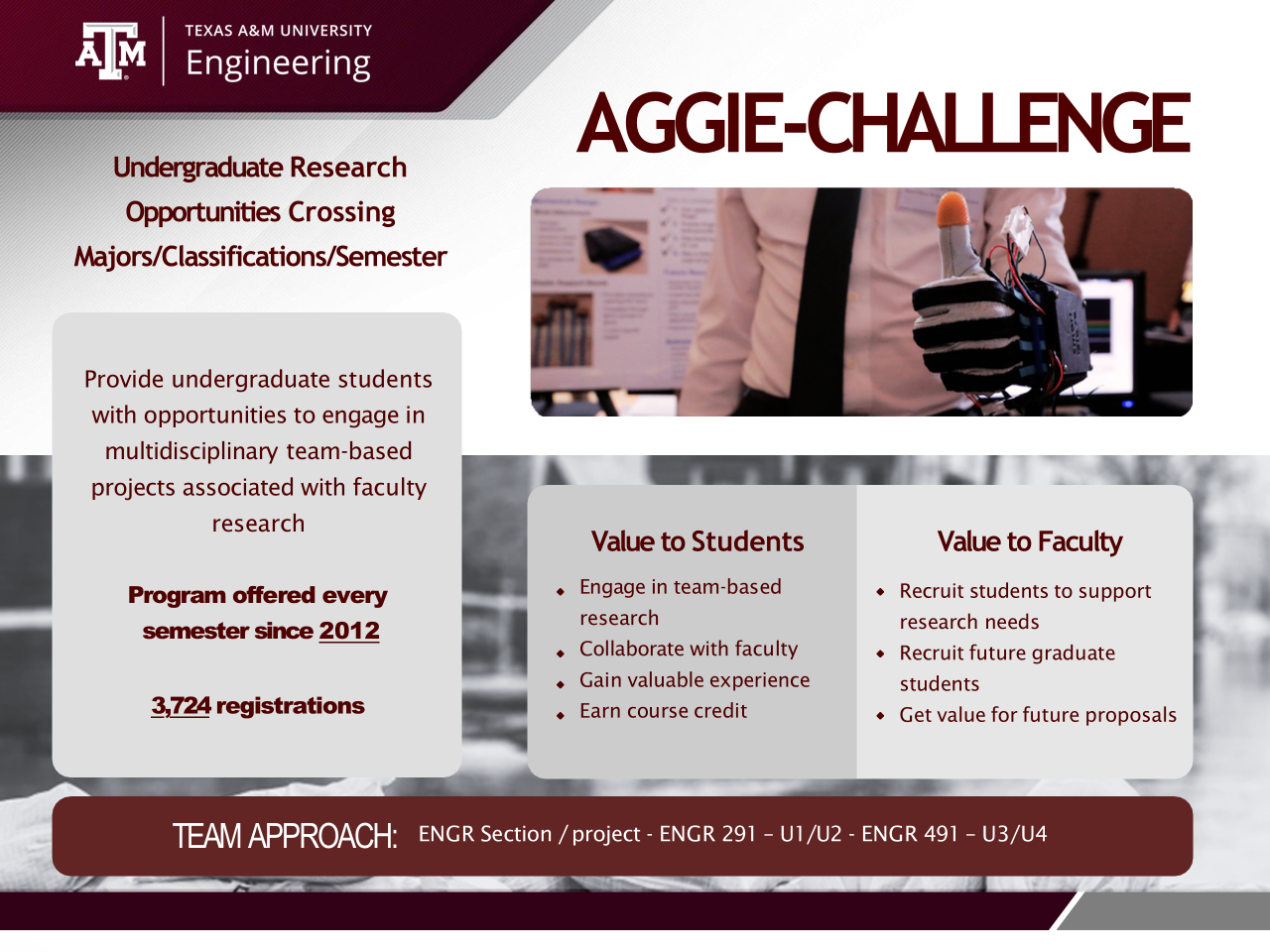
Texas A&M University Engineering
AGGIE-CHALLENGE
Undergraduate Research
Opportunities Crossing
Majors / Classifications / Semester
Provide undergraduate students with opportunities to engage in multidisciplinary team-based projects associated with faculty research
Program offered every semester since 2012
3,724 registrations
Value to Students
- Engage in team-based research
- Collaborate with faculty
- Gain valuable experience
- Earn course credit
Value to Faculty
- Recruit students to support research needs
- Recruit future graduate students
- Get value for future proposals
Team Approach
ENGR Section / project – ENGR 291 – U1 / U2 – ENGR 491 – U3 / U4
This Engineering Academic and Student Affairs (EASA) program is designed to provide engineering undergraduates opportunities to collaborate on multidisciplinary teams and work directly with faculty and graduate students in developing solutions for grand engineering challenges facing our society. The program is open to students from freshman to senior level and participants can pursue projects of interest to them and in departments outside their major. Students enroll in and ENGR 291 or 491 section specific to the faculty project. Since 2012, the program attracted more than 2,000 registrations. The program provides faculty an opportunity to identify students across the college with relevant skills to support their research.

Aggie Research Program (ARP)
Graduate Professional Development
ARP Leader Meeting + ARP Research Team
Diverse Undergraduate Research Teams
Quick Facts
- 1,020 research teams since 2016
- 30% growth/year
- 1,200 participants in AY 21-22
- Majors from all 12 TAMU colleges
- 41% participants underrepresented in STEM
- 42 faculty on submitted diversity grants in AY21-22
RESEARCH LEADRSHIP PROGRAMS SUPPORTED
- DeBakey Executive Research Leadership Program
- Aggie Research Mentoring Program
- Neuroscience Research Leadership Program
- Genetics and Genomics Research Leadership Program
- Addiction Research Leadership Program
- ADD YOUR PROGRAM HERE
AggieResearch.tamu.edu
Contact: Christopher Quick (cquick@tamu.edu)
Over the past 6 years, hundreds of graduate students, postdocs, and junior faculty have advanced their own research programs while developing critical leadership skills needed in the next stage of their research careers. Team leaders select and manage groups of 3-8 undergraduate researchers recruited with help of the Aggie Research Program. Our research education model has characteristics for successful propagation that are of particular interest to the NSF: 1) Scalability: participation has grown 30% each of the first 5 years, and now creates over 1,200 research and research leadership opportunities per year. 2) Adaptability: the model has been applied to diverse disciplines across 12 colleges at TAMU. 3) Sustainable: the program is very efficient and is supported by recurring funds. 4) Inclusivity: 41% of participants belong to underrepresented groups, which matches the undergraduate student population at TAMU.
Is an online platform designed to simplify recruitment for participants in approved clinical trials, online surveys and controlled experiments at Texas A&M University. ARV also offers a user-friendly search tool, making it easier for participants to find studies that match their interests.
This program provides STEM educators with tools necessary for advancements in science, technology, engineering, and mathematics. The Aggie STEM Summer Camps (ASSC) give students real world experiences in STEM education through inquiry learning and provide a world-class university experience with Texas A&M University professors in STEM fields.
Aggieland Saturday is a university-wide open house created to help prospective students and their families learn about the opportunities available at Texas A&M University. Each academic college and many student service offices provide fun and informational sessions throughout the day. Spring each year. For HS Juniors and Seniors. Work through your college or department to engage in this event.
The Center for Educational Technologies specializes in developing education programs, trainings and outreach activities which compliment technical experts’ research activities. Many external sponsors request that researchers’ scientific findings be disseminated through education and outreach programs. This is where the CET’s faculty can step in. By partnering with the CET, researchers can focus on their technical expertise, while CET faculty translates your research into training programs and disseminating findings to the general public. The CET offers online hosting services for websites and virtual learning. The CET has a state-of-the-art video production studio on campus, video equipment to film on-location, and equipment to film on-the-go, such as with GoPros. The CET has worked with industry, academic and government research partners on both public and private grants.

Center for Teaching Excellence
Mission
The Center for Teaching Excellence supports Texas A&M University’s educational mission by forging partnerships to inspire and sustain faculty, student, and organizational transformation through innovative, dynamic, and inclusive learning design guided by evidence-based practices.
Vision
An institution-wide culture of excellence in teaching and learning grounded in evidence-based pedagogy through critical reflection on personal and educational assumptions, intentions, and reasons – recognizing and affirming the inherent value of varied perspective, which are integral to teaching, and striving to ensure faculty, teaching assistants, and students of all backgrounds and identities are welcomed and provided with the resources and skill development they need to excel.
Values
- Interdisciplinary Collaboration: Working together across disciplines to reach new understandings of complex issues and potential solutions.
- Compassionate Service: Embodying the Aggie Core Value of selfless service – the giving of one’s self for the greater good, without regard to personal gain or recognition – as instructors, mentors, students, and fellow citizens.
- Transformational Curricular Innovation: Enhancing curriculum at both the program and the course level so that it is current, relevant, learner–centered, and high-impact.
- Distinctive Quality: Maintaining a high standard of excellence consistently in all activities.
- Celebratory Recognition: Honoring the accomplishments and contributions of faculty of all academic ranks engaged in instruction.
- Visionary Leadership: Designing structures that challenge assumptions and support transformation.
Five Specialized Emphasis Areas
Texas A&M University | Center for Teaching Excellence
- Educational Development and Recognition (for Faculty and Graduate Students)
- Digital Learning (Canvas LMS, Generative AI)
- Curriculum Development and Support (Curricular Redesign)
- Scholarship of Teaching and Learning (Classroom Research)
- Mentoring and Graduate Education (Developing a Culture of Mentoring)
Broader Impacts
The Center assists faculty with identifying methods appropriate to meeting the educational outcomes of proposals including learning outcomes, assessment strategies, and instructional approaches. A letter of collaboration can be provided. To connect with a member of our team, click here.
Contact CTE
John R. Blocker, Suite 232
4246 TAMU
Nagle Hall, Suite 305
3002 TAMU
College Station TX 77843
979.845.8392
cte@tamu.edu
https://cte.tamu.edu
Center for Teaching Excellence offers instructional professional development for those engaged in the teaching mission of Texas A&M University. Whether you teach in a traditional classroom setting, within the campus learning management system, or utilize a hybrid format- our team can assist you with creating and maintain an effective and efficient learning environment that supports student success. The Center assists faculty with identifying methods appropriate to the educational broader impacts of proposals. Educational Consultants can advise on connecting proposal outcomes to student learning outcomes for a course, selecting instructional strategies aligned with outcomes, and identifying assessments to gather evidence of student learning. A letter of collaboration can be provided. Faculty can also learn about the Scholarship of Teaching and Learning (SoTL) as a potential component of their project.
The Department of Chemistry takes an active role in community outreach, local primary and secondary education, and hosting events to positively affect the future of chemical education. Every year, our feature event – the annual Chemistry Open House & Science Exploration Gallery – is hosted at the ILSQ laboratory building. Typically visited by over 1,000 guests, this event brings together the Department’s researchers, different programs on campus, and those intrigued by science. Throughout the year, the Chemistry Road Show, a mobile set of demonstration experiments, is presented to schools throughout Texas and at other public events with the aim to both entertain and educate students using chemistry. Led by Dr. Jim Pennington, the Road Show will travel 11,000 miles throughout the year, reaching thousands of Texas students, faculty, and administrators. Our Research Experiences for Undergraduates program sponsored by the National Science Foundation provides college students of diverse backgrounds an opportunity to experience a summer of laboratory research. The Department of Chemistry also brings hands-on activities to local schools and campus outreach and recruiting events.

Contemporary Issues in Science: Broader Impact
- Faculty as Science Literacy Advocates
- Interdisciplinary Teaching for Deeper Understanding
- Improving Students’ Ability to Identify and Challenge Mis/disinformation & Pseudoscience
- Encouraging Faculty – Student Mentorship in Science Education
- Expanding the Reach of STEM Education Beyond Traditional Majors
Course Coordinator: Tamara Powers (tmpowers@tamu.edu)
ARSC 104 Syllabus
ARSC 105 Syllabus
The Contemporary Issues in Science Course Series (ARSC 104 & 105) is a multidisciplinary, team-taught program that fulfills the CORE Life & Physical Sciences curriculum requirement. It brings together faculty experts from various departments within the College of Arts and Sciences to address misinformation, disinformation, and pseudoscience related to socio-scientific issues. Course topics include the Big Bang, the size and shape of the Earth, the age of the Earth, evolution, vaccines, stem cells, human reproduction, GMOs, climate change, and energy. We actively recruit new faculty to give single guest lectures or a series of lectures on broader topics. Faculty are encouraged to incorporate active learning techniques and focus on providing evidence-based reasoning to support the claims presented in the course.
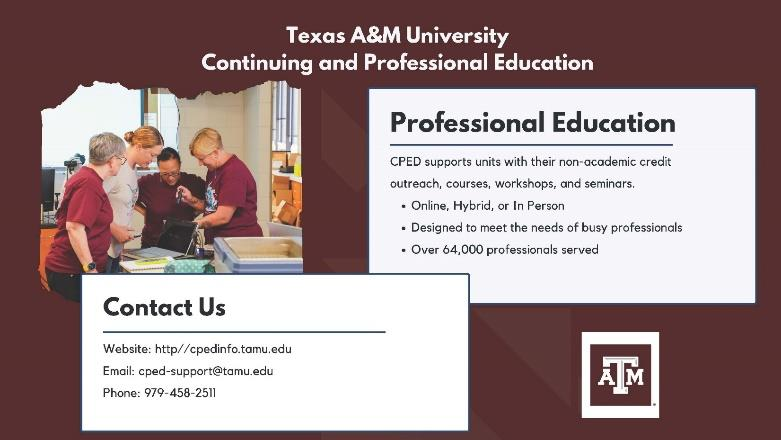
Texas A&M University Continuing and Professional Education
Professional Education
CPED supports units with their non-academic credit outreach, courses, workshops, and seminars.
- Online, Hybrid, or In Person
- Designed to meet the needs of busy professionals
- Over 64,000 professionals served
Contact Us
Website: https://cpedinfo.tamu.edu/
Email: cped-support@tamu.edu
Phone: 979-458-2511
The Contemporary Issues in Science Course Series (ARSC 104 & 105) is a multidisciplinary, team-taught program that fulfills the CORE Life & Physical Sciences curriculum requirement. It brings together faculty experts from various departments within the College of Arts and Sciences to address misinformation, disinformation, and pseudoscience related to socio-scientific issues. Course topics include the Big Bang, the size and shape of the Earth, the age of the Earth, evolution, vaccines, stem cells, human reproduction, GMOs, climate change, and energy. We actively recruit new faculty to give single guest lectures or a series of lectures on broader topics. Faculty are encouraged to incorporate active learning techniques and focus on providing evidence-based reasoning to support the claims presented in the course.
The CERS office assists faculty in obtaining federal and private funding for research that is multidisciplinary, larger, or more strategic in nature. This unique office was created to help faculty manage the administrative burden of these larger projects so they may focus on what they do best—research. In order to accomplish this mission, the office provides faculty with support and coordination of large, multidisciplinary and strategic proposals; and engages private industry and seeks out opportunities for innovative research that aligns with the private entity’s goals, the faculty member’s interests, and the mission of Texas A&M AgriLife. This group works to develop and maintain relationships with AgriLife faculty, partnering institutions, companies, and funding agencies to achieve the best fit between funding opportunities and researcher goals.
G-Camp is a 14-day field excursion for thirty 5th – 12th grade earth science teachers that provides first-hand experience with the principles of geology in the field, helps teachers develop new curriculum and virtual fieldtrips for your classroom, and makes outdoor learning fun and exciting. G-Camp will provide teachers with an introduction to the principles of geology, as well as the opportunity to develop and share curriculum materials to teach the standards required for grades 5 – 12. This field experience puts the teachers on the outcrop of ancient marine rocks, on the slope of a volcano, on a fault, in a spectacular glacial valley, crossing sand dunes, at the toe of a landslide, in a pristine flowing stream, on landslides, and in mines and caves - to mention just a few of the experiences of G-Camp. The teachers collect samples during the trip to augment their lessons.
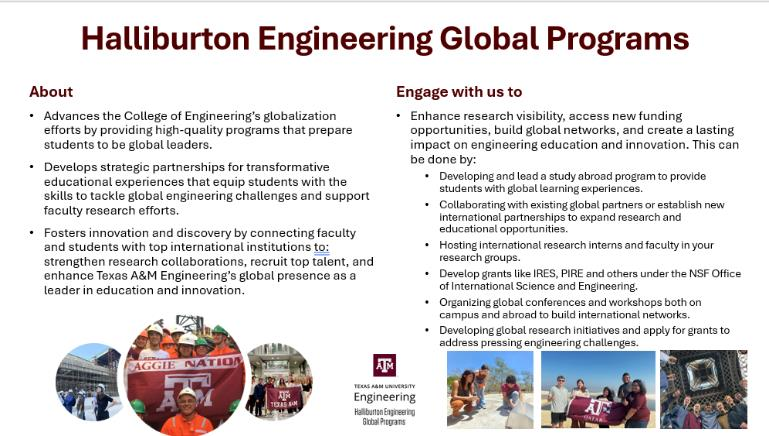
Halliburton Engineering Global Programs
About
- Advances the College of Engineering’s globalization efforts by providing high-quality programs that prepare students to be global leaders.
- Develops strategic partnerships for transformative education experiences that equip students with the skills to tackle global engineering challenges and support faculty research efforts.
- Fosters innovation and discovery by connect faculty and students with top international institutions to: strengthen research collaborations, recruit top talent, and enhance Texas A&M Engineering’s global presence as a leader in education and innovation.
Engage with us to
- Enhance research visibility, access new funding opportunities, build global networks, and create a lasting impact on engineering education and innovation. This can be done by:
- Developing and lead a study abroad program to provide students with global learning experiences.
- Collaborating with existing global partners or establish new international partnerships to expand research and education opportunities.
- Hosting international research interns and faculty in your research groups.
- Develop grants like IRES, PIRE and others under the NSF Office of International Science and Engineering
- Organizing global conferences and workshops both on campus and abroad to build international networks.
- Developing global research initiatives and apply for grants to address pressing engineering challenges.
Texas A&M University | Engineering | Halliburton Engineering Global Programs
The Halliburton Engineering Global Programs (HEGP) at Texas A&M University plays a pivotal role in advancing the College of Engineering’s globalization efforts by providing high-quality programs that prepare students to be leaders in the global industry and society. Through strategic partnerships and faculty collaboration, we develop transformative educational experiences that equip students with the skills to tackle global engineering challenges. Our initiatives foster innovation and discovery by connecting faculty and students with esteemed international institutions, driving research excellence, and enhancing Texas A&M Engineering’s global presence. By engaging with top universities around the worldwide, we strengthen research, recruit top students, and position Texas A&M Engineering as a global leader in engineering education and innovation. We offer faculty members valuable opportunities to expand their global engagement and impact. Faculty members can engage with HEGP to develop and lead a study abroad programs, work with our existing global partners or establish new international collaborations, host international research interns and faculty in their research groups and organize global conferences and workshops both on campus and abroad. We also support faculty in developing global research initiatives and applying for grants to address global engineering challenges. Through these efforts, we help faculty enhance their research visibility, access new funding opportunities, build international networks, and create lasting global impact in engineering education and innovation.
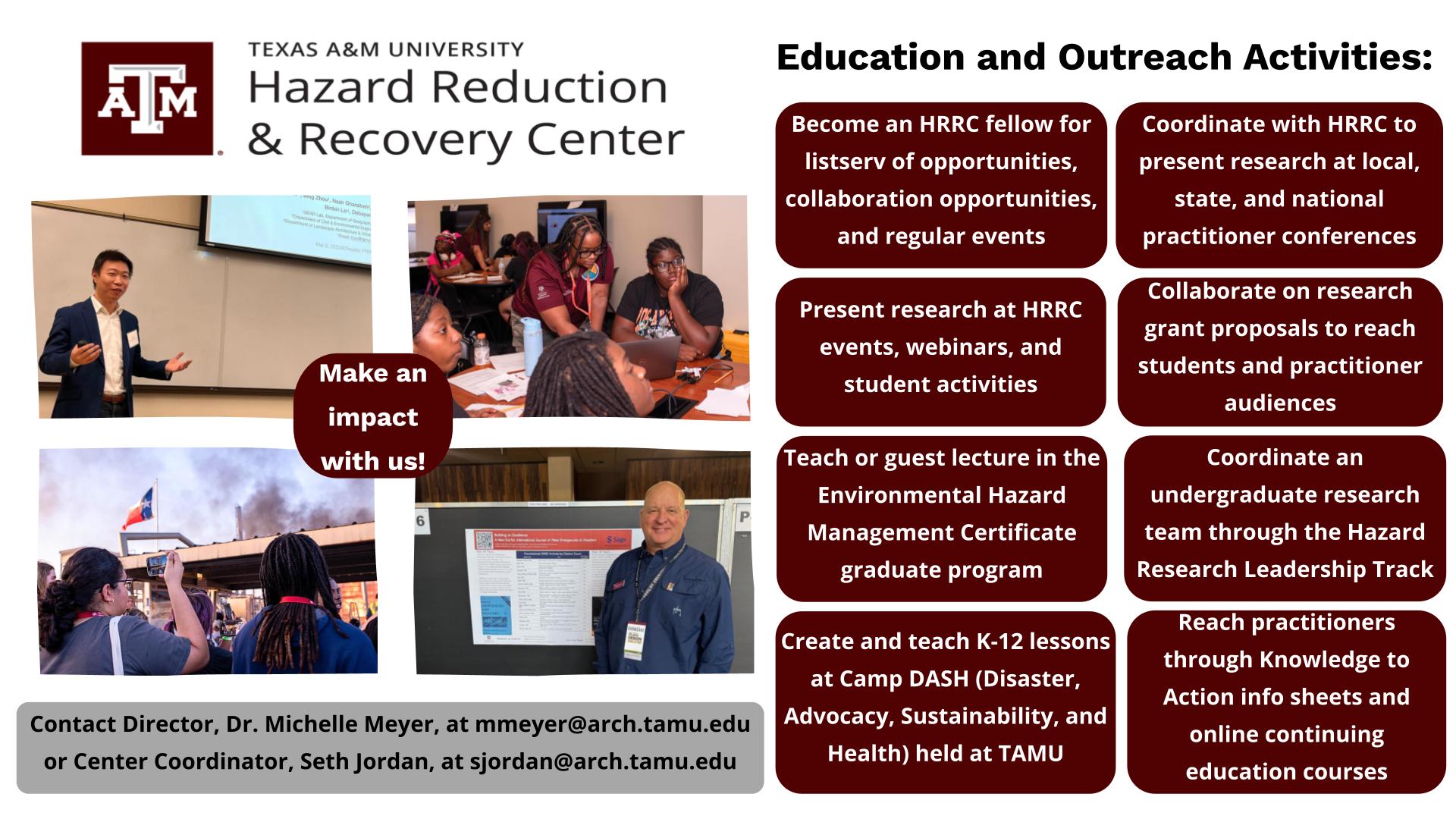
Texas A&M University Hazard Reduction & Recovery Center
Make an impact with us!
Contact Director, Dr. Michelle Meyer, at mmeyer@arch.tamu.edu
or Center Coordinator, Seth Jordan, at sjordan@arch.tamu.edu
Education and Outreach
Become an HRRC fellow for listserv of opportunities, collaboration opportunities, and regular events
Coordinate with HRRC to present research at local, state, and national practitioner conferences
Present research at HRRC events, webinars, and student activities
Collaborate on research grant proposals to reach students and practitioner audiences
Teach or guest lecture in the Environmental Hazard Management Certificate graduate program
Coordinate an undergraduate research team through the Hazard Research Leadership Track
Create and teach K-12 lessons at Camp DASH (Disaster, Advocacy, Sustainability, and Health) held at TAMU
Reach practitioners through knowledge to Action info sheets and online continuing education courses
The Hazard Reduction and Recovery Center (HRRC) is an interdisciplinary disaster and hazard center housed under the Department of Landscape Architecture and Urban Planning. It is the first academic center in the nation dedicated to vulnerability reduction and long-term recovery and is one of only two United Nations (UN-OCHA) joint centers in the world that functions as a research and consultancy institution. The HRRC’s educational activities include a nonprofit collaboration to increase climate justice, public health, and urban planning in high school emergency management training in Southeast, TX, as well as interdisciplinary integration in postsecondary disaster and hazard courses and research projects. The HRRC is involved in an array of outreach, primarily focusing on research dissemination to practitioners and public audiences.
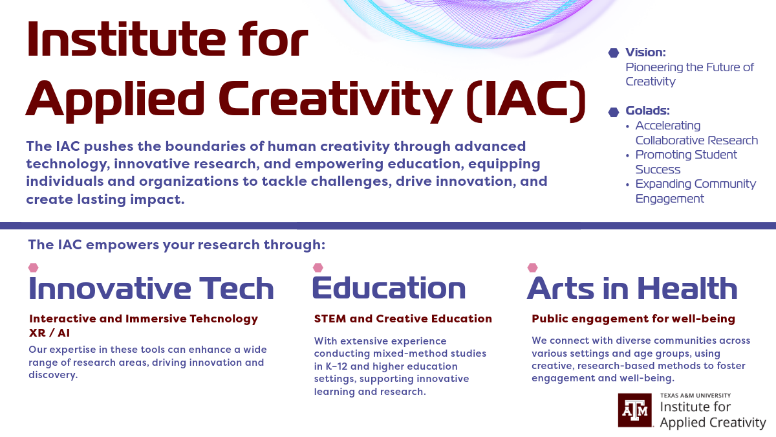
Institute for Applied Creativity (IAC)
The IAC pushes the boundaries of human creativity through advanced technology, innovative research, and empowering education, equipping individuals and organizations to tackle challenges, drive innovation, and create lasting impact.
Vision:
Pioneering the Future of Creativity
Golads:
- Accelerating Collaborative Research
- Promoting Student Success
- Expanding Community Engagement
The IAC empowers your research through:
Innovative Tech
Interactive and immersive Tehcnology XR / AI
Our expertise in these tools can enhance a wide range of research areas, driving innovation and discovery.
Education
STEM and Creative Education
With extensive experience conducting mixed-method studies in K-12 and higher education settings, supporting innovative learning and research.
Arts in Health
Public engagement for well-being
We connect with diverse communities across various settings and age groups, using creative, research-based methods to foster engagement and well-being.
Texas A&M University Institute for Applied Creativity
The Institute for Applied Creativity (IAC) stands at the intersection of imagination, innovation, and impact. We are dedicated to pushing the boundaries of human creativity through advanced technology, pioneering research, and transformative education. By fostering interdisciplinary collaboration, we empower faculty, students, and community members to explore new creative frontiers and generate meaningful, lasting outcomes. At the IAC, we provide the tools, resources, and mentorship necessary to address complex challenges, spark innovation, and create positive societal change. Our diverse programs engage participants across all age groups and backgrounds, including K–12 students, individuals with disabilities, and lifelong learners. Our Institute extends beyond traditional academic settings. We offer interactive workshops, and seminars designed to inspire creativity and enhance practical skills. Additionally, we partner with K–12 educators, universities, local community leaders and industry leaders to develop innovative practices that bridge the gap between research and real-world application. Through immersive, research-based experiences, we connect with diverse communities to promote engagement, well-being, and a deeper understanding of the transformative power of creativity.
Institute for Engineering Education and Innovation is a joint center of Texas A&M University’s College of Engineering and Texas A&M Engineering Experiment Station (TEES) that aims to make Texas A&M the best in Engineering Education research, teaching, and service. The Institute’s mission is to engage in research and professional development to advance the practice of Engineering Education, by creating, synthesizing, and disseminating research leading to the development of inclusive and transformative engineering learning environments for students and educators. The Institute’s vision is to be recognized as an innovative leader in Engineering Education by 2030, through its scholarly impact, innovative academic prowess, and community of practice, based on its values of respect, excellence, loyalty, leadership, and integrity.
We run a Saturday afternoon outreach activity for gifted students in 5th-12th grades called MATH Circle. We also run a 2-week Summer Education Enrichment in Math (SEE-Math) for gifted students entering 6th-8th grades. These are students who will be our future STEM scientists. Adding a $1000 line item dedicated to the Math Circle and/or SEE-Math serves as a Broader Impact for any STEM Grant.
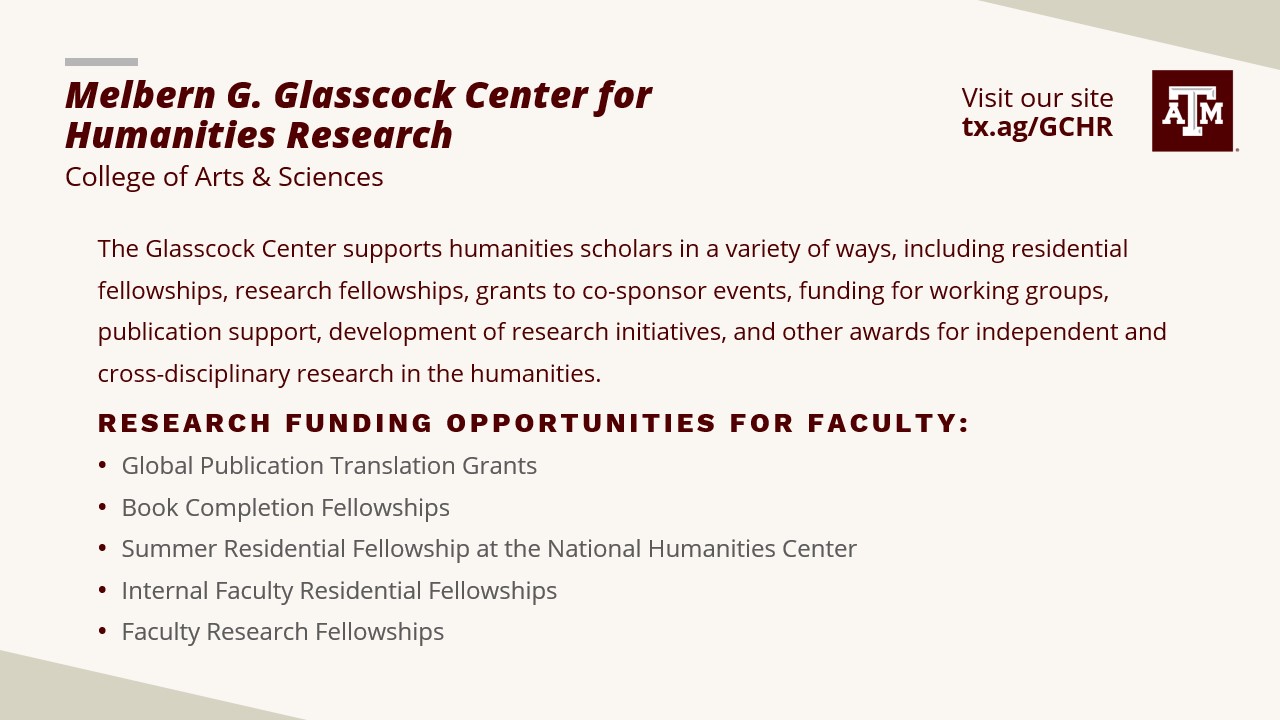
Melbern G. Glasscock Center for Humanities Research
College of Arts & Sciences
Visit our site tx.ag/GCHR
The Glasscock Center supports humanities scholars in a variety of ways, including residential fellowships, research fellowships, grants to co-sponsor events, funding for working groups, publication support, development of research initiatives, and other awards for independent and cross-disciplinary research in the humanities.
Research Funding Opportunities for Faculty:
- Global Publication Translation Grants
- Book Completion Fellowships
- Summer Residential Fellowship at the National Humanities Center
- Internal Faculty Residential Fellowships
- Faculty Research Fellowships
The Glasscock Center seeds, incubates, and facilitates humanities research at Texas A&M through a wide range of funded awards and programs. These include residential and research fellowships for faculty and graduate students, short-term visiting fellowships, and an undergraduate summer scholars program. The Center also provides support for research working groups, small conferences, external speakers, and workshops – in addition to providing programming through its own themed research initiatives. The Susanne M. Glasscock Book Prize annually recognizes an outstanding book in the humanities that appeals to academic and nonacademic audiences alike.
The Meloy Engineering Innovation & Entrepreneurship Program equips you with the skills, knowledge and experiences needed to be successful in industry. Whether you’re interested in launching your own startup, commercializing your product or leading design and innovation at a Fortune 500 company, we will help you develop the entrepreneurial mindset necessary for your success. The Meloy Program offers a wide range of programs and events that will help promote students’ understanding of business principles from an engineering perspective. Students will practice their innovation and entrepreneurship skills in an immersive and creative environment.
The Office for Youth Engagement at Texas A&M University provides expertise, resources, and consulting to faculty and researchers developing youth-focused programs and outreach initiatives. Our team offers a comprehensive toolkit grounded in best practices for youth engagement, including strategies for program design, participant development, and program marketing. We also assist with connecting to youth audiences in the community, ensuring that your programs create meaningful impact and align with positive youth development principles. Whether you are seeking support to meet grant requirements, develop a new initiative, or improve an existing program, we are here to help you succeed.
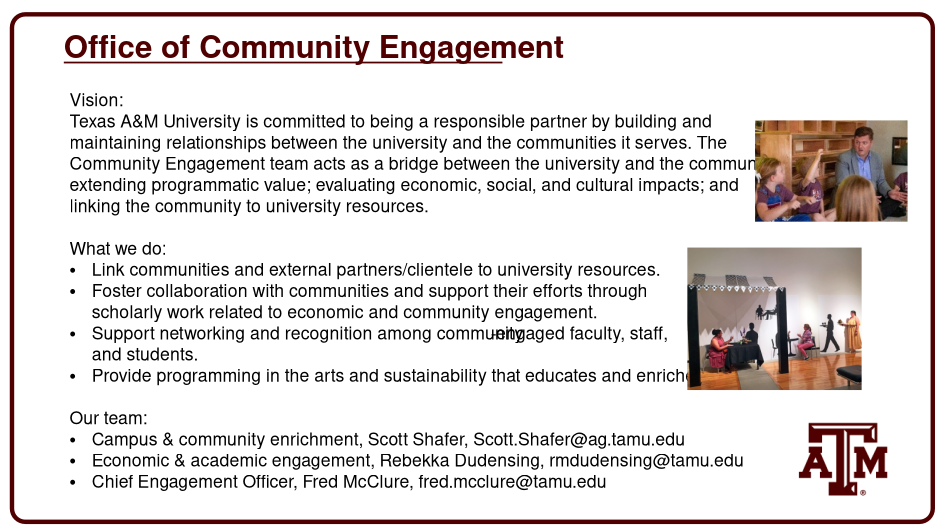
Office of Community Engagement
Vision:
Texas A&M University is committed to being a responsible partner by building and maintaining relationships between the university and the communities it serves. The Community Engagement team acts as a bridge between the university and the community, extending programmatic value; evaluating economic, social, and cultural impacts; and linking the community to university resources.
What we do:
- Link communities and external partners/clientele to university resources.
- Foster collaboration with communities and support their efforts through scholarly work related to economic and community engagement.
- Support networking and recognition among community-engaged faculty, staff, and students.
- Provide programming in the arts and sustainability that educates and enriches.
Our team:
- Campus & community enrichment, Scott Shafer, Scott.Shafer@ag.tamu.edu
- Economic & academic engagement, Rebekka Dudensing, rmdudensing@tamu.edu
- Chief Engagement Officer, Fred McClure, fred.mcclure@tamu.edu
The Community Engagement team acts as a bridge between the university and the community, extending programmatic value; evaluating economic, social, and cultural impacts; and linking the community to university resources.
The Office of National Fellowships at Texas A&M University supports students in pursuing nationally and internationally competitive awards. Our office provides guidance throughout the application process, from identifying opportunities to developing strong application materials. We collaborate with faculty, staff, and campus partners to create an environment where students can excel in their academic and professional aspirations. Through mentorship, advising, and tailored resources, we help Texas A&M University students maximize their potential and achieve their goals.
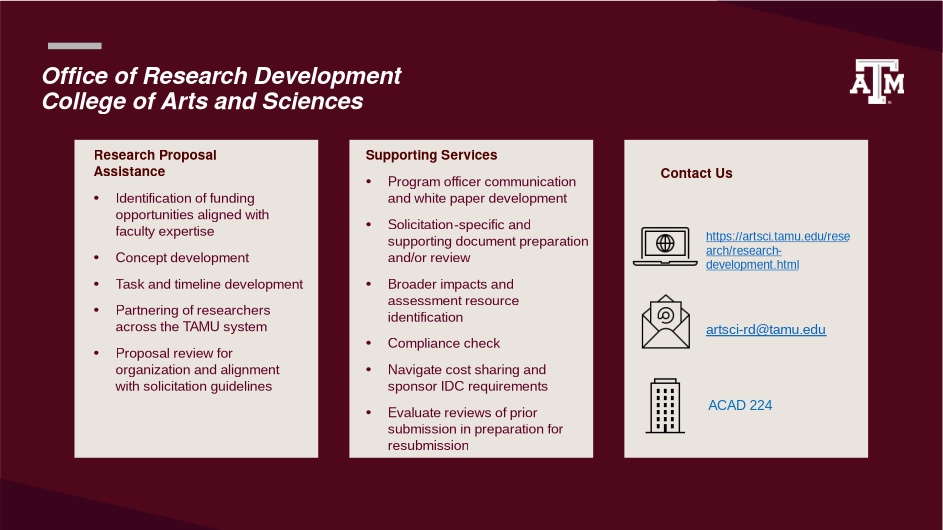
Office of Research Development
College of Arts and Sciences
Research Proposal Assistance
- Identification of funding opportunities aligned with faculty expertise
- Concept development
- Task and timeline development
- Partnering of researchers across the TAMU system
- Proposal review for organization and alignment with solicitation guidelines
Supporting Services
- Program office communication and white paper development
- Solicitation-specific and supporting document preparation and/for review
- Broader impacts and assessment resource identification
- Compliance check
- Navigate cost sharing and sponser IDC requirements
- Evaluate reviews of prior submission in preparation for resubmission
Contact Us
https://artsci.tamu.edu/research/research-development.html
artsci-rd@tamu.edu
ACAD 224
The Office of Research Development (ORD) is dedicated to supporting research excellence within TAMU’s College of Arts & Sciences. This includes assisting faculty (including APT) in the development and preparation of high-quality proposals for federal and foundation funding, as well as providing guidance and resources to graduate students and post-doctoral fellows seeking fellowship opportunities.
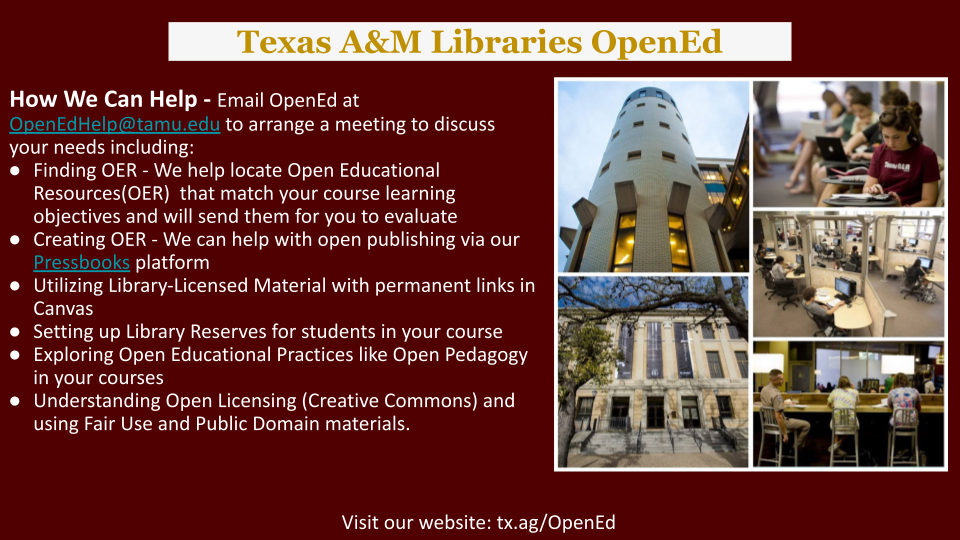
Texas A&M Libraries OpenEd
How We Can Help
Email OpenEd at OpenEdHelp@tamu.edu to arrange a meeting to discuss your needs including:
- Finding OER – We help locate Open Education Resources(OER) that match your course learning objects and will send them for you to evaluate
- Creating OER – we can help with open publishing via our Pressbooks platform
- Utilizing Library-Licensed Material with permanent links in Canvas
- Setting up Library Reserves for students in your course
- Exploring Open Education Practices like Open Pedagogy in your courses
- Understanding Open Licensing (Creative Commons) and using Fair Use and Public Domain materials.
Visit our website: tx.ag/OpenEd
OpenEd at Texas A&M champions student success through the development, promotion, and use of Open Educational Resources (OERs). We help faculty discover and implement OERs alongside other free and low-cost instructional materials including library-licensed content and library reserves. We support faculty who want to utilize Open Pedagogy to support Learner Agency in the classroom. Si for Open Digital Publishing for course materials creation using Pressbooks.
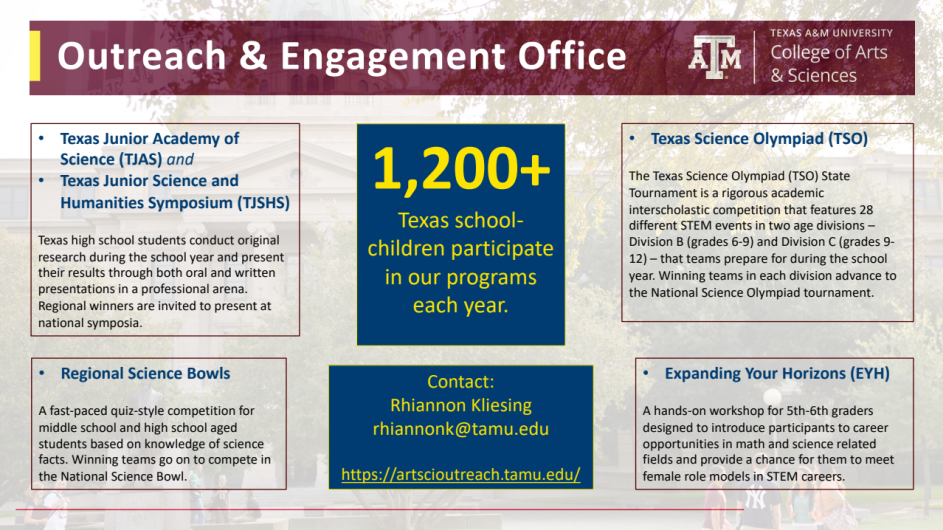
Outreach & Engagement Office
Texas A&M University | College of Arts & Sciences
Texas Junior Academy of Science (TJAS) and Texas Junior Science and Humanities Symposium (TJSHS)
Texas high school students conduct original research during the school year and present their results through both oral and written presentations in a professional arena. Regional winners are invited to present at national symposia.
Regional Science Bowls
A fast-paced quiz-style competition for middle school and high school aged students based on knowledge of science facts. Winning teams go on to compete in the National Science Bowl.
1,200+ Texas school-children participate in our programs each year
Contact: Rhiannon Kliesing, rhiannonk@tamu.edu, https://artscioutreach.tamu.edu/
Texas A&M University | College of Arts & Sciences
Texas Science Olympiad (TSO)
The Texas Science Olympiad (TSO) State Tournament is a rigorous academic interscholastic competition that features 28 different STEM events in two age divisions – Division B (grades 6-9) and Division C (grades 9-12) – that teams prepare for during the school year. Winning teams in each division advance to the National Science Olympiad tournament.
Expanding Your Horizons (EYH)
A hands-on workshop for 5th-6th graders designed to introduce participants to career opportunities in math and science related fields and provide a chance for them to meet female role models in STEM careers.
The Outreach & Engagement office promotes degree programs in the College of Arts and Sciences and encourages career interests in the sciences, social sciences and humanities by organizing and facilitating educational events and competitions that engage pre-college learners in grades 5-12.
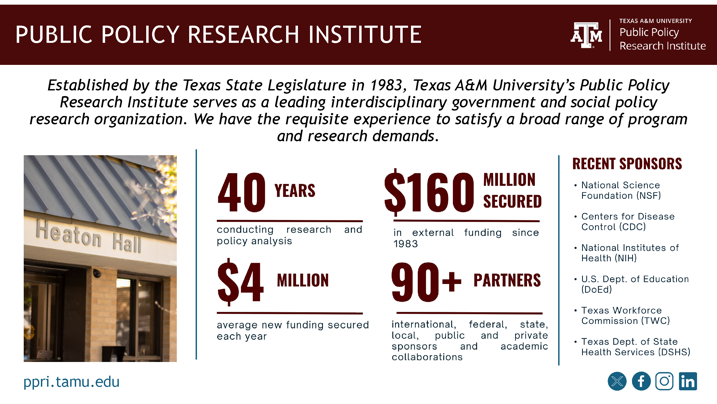
Public Policy Research Institute
Texas A&M University | Public Policy Research Institute
Established by the Texas State Legislature in 1983, Texas A&M University’s Public Policy Research Institute serves as a leading interdisciplinary government and social policy research organization. We have the requisite experience to satisfy a broad range of program and research demands.
- 40 years conducting research and policy analysis
- $160 million secured in external funding since 1983
- $4 million average new funding secured each year
- 90+ partners international, federal, state, local, public and private sponsors and academic collaborations
Recent Sponsors
- National Science Foundation (NSF)
- Centers for Disease Control (CDC)
- National Institutes of Health (NIH)
- U.S. Dept. of Education (DoEd)
- Texas Workforce Commission (TWC)
Established by the Texas State Legislature in 1983, Texas A&M University’s Public Policy Research Institute serves as a leading interdisciplinary government and social policy research organization. We have the requisite experience to satisfy a broad range of program and research demands. Previous sponsors and clients include: National Science Foundation, Center for Disease Control and Prevention, National Institutes of Health, U.S. Department of Education, Centers for Medicare & Medicaid Services, Texas Workforce Commission.
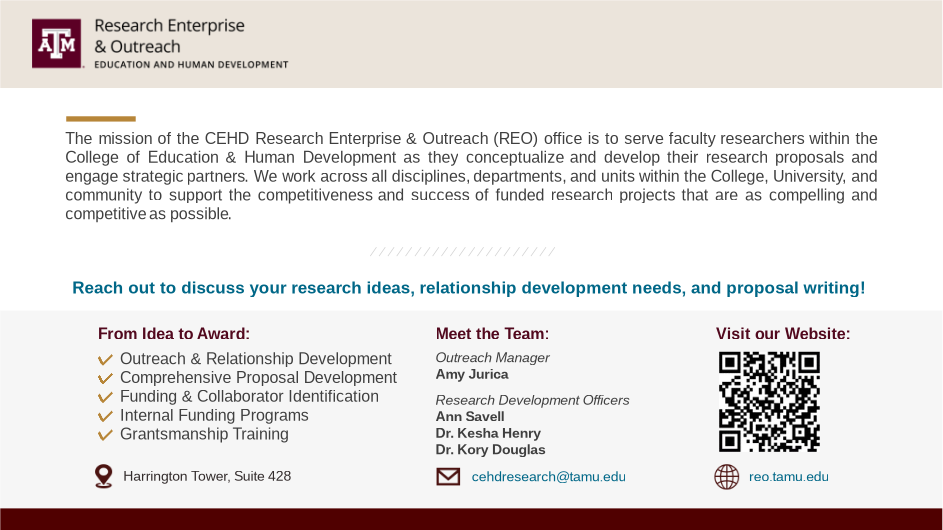
Research Enterprise & Outreach
Education and Human Development
The mission of the CEHD Research Enterprise & Outreach (REO) office is to serve faculty researchers within the College of Education & Human Development as they conceptualize and develop their research proposals and engage strategic partners. We work across all disciplines, departments, and units within the College, University, and community to support the competitiveness and success of funded research projects that are as compelling and competitive as possible.
Reach out to discuss your research ideas, relationship development needs, and proposal writing!
From Idea to Award:
- Outreach & Relationship Development
- Comprehensive Proposal Development
- Funding & Collaborator Identification
- Internal Funding Programs
- Grantsmanship Training
Meet the Team:
Outreach Manager
- Amy Jurica
Research Development Officers
- Ann Savell
- Dr. Kesha Henry
- Dr. Kory Douglas
Harrington Tower, Suite 428
Research Enterprise and Outreach serves researchers in the College of Education and Human Development in improving the success and competitiveness of their research endeavors, working with faculty, administrators, and strategic partners to help secure and manage funding for research.

Spark! PK-12 Engineering Education Outreach
Texas A&M University Engineering
How can we help you?
Sparking Interest
[PK-12 Students]
- Spark! on the Road utilizes your research to engage students through an interactive activity
- Help judge the Texas Science and Engineering Fair. March 29, 2025
- Engage with students with an interactive booth at A Night at the ZACH. March 28, 2025
- Help us judge Invention Convention Texas. May 3, 2025
Fanning the Flame
[Teachers, Counselors, Administrators, Families]
- E3, a Research Experience for Teachers, summer
- Present your research to K-12 teachers virtually at STEM 4 Innovation Conference.
- MakerU, share your research as PD
Spark! PK-12 Engineering Education Outreach | spark@tamu.edu
Ignite an engineering spirit!
Spark! PK-12 Engineering Education Outreach at Texas A&M University is a dynamic group dedicated to promoting engineering education among PK-12 students and teachers. Our mission is to ignite a passion for STEM through engaging and hands-on experiences. To engage with PK-12 students, we offer the program ‘Sparking Interest,’ providing exciting opportunities through activities such as Spark! on the Road, the Texas Science and Engineering Fair, Invention Convention Texas, and Aggies Invent Jr. These initiatives aim to captivate young minds, fostering curiosity and interest in the field of engineering. In addition to our student-focused programs, we understand the crucial role teachers play in shaping the educational landscape. Through our ‘Fanning the Flame’ program, we collaborate with PK-12 teachers, offering Enrichment Experiences in Engineering (E3), MakerU Professional Development, and participation in the STEM 4 Innovation Virtual Conference. These initiatives are designed to empower educators with valuable resources and insights, enhancing their ability to inspire the next generation of innovators. Furthermore, as part of our commitment to supporting Texas A&M University faculty with their broader impacts, we actively involve them in these programs, creating a collaborative ecosystem that benefits both faculty and the broader community.
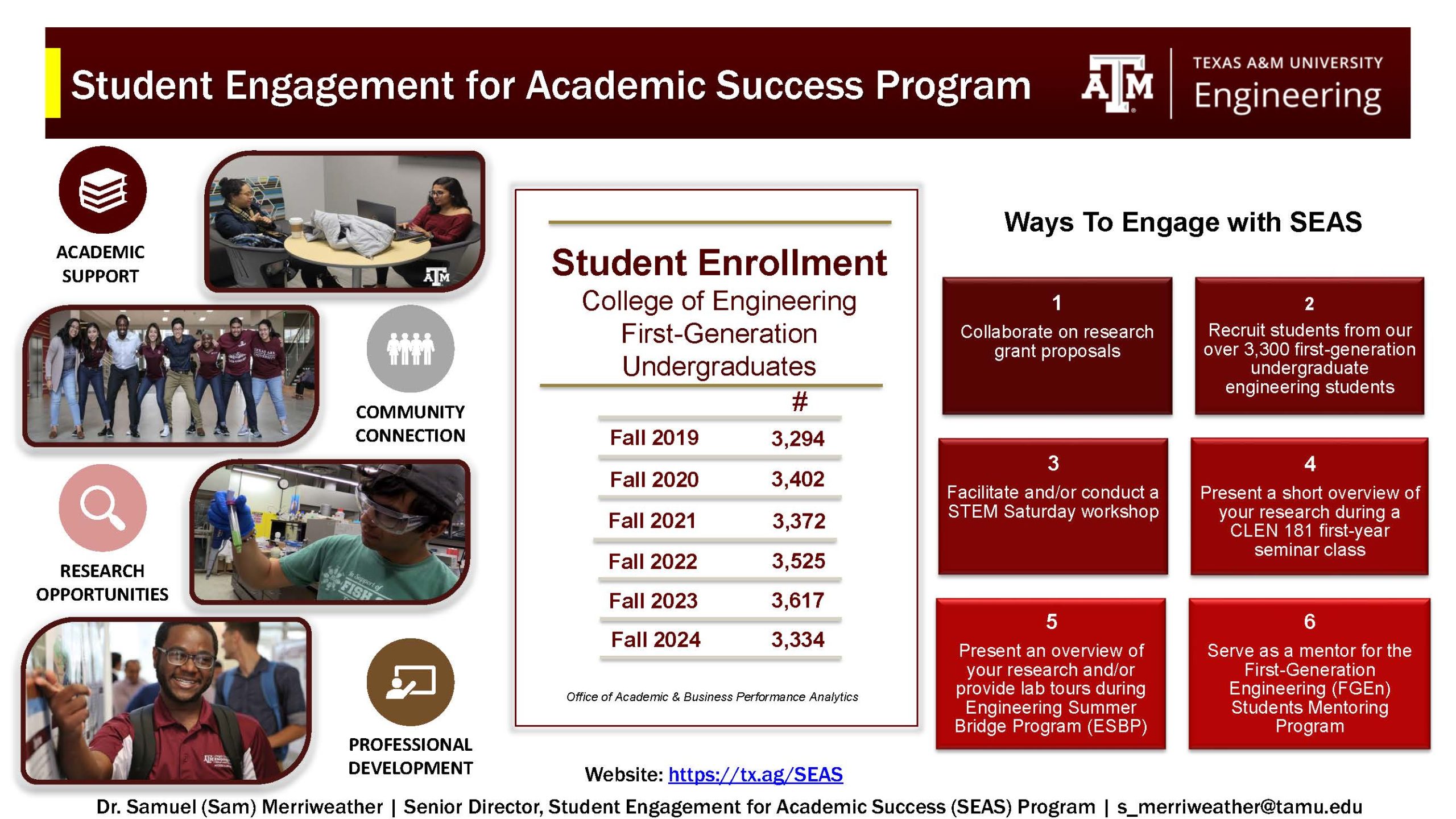
Student Engagement for Academic Success Program
Texas A&M University | Engineering
ACADEMIC SUPPORT
COMMUNITY CONNECTION
RESEARCH OPPORTUNITIES
PROFESSIONAL DEVELOPMENT
Student Enrollment
College of Engineering First Generation Undergraduates
Fall 2019: 3,294
Fall 2020: 3,402
Fall 2021: 3,372
Fall 2022: 3,525
Fall 2023: 3,617
Fall 2024: 3,334
Office of Academic & Business Performance Analytics
Ways To Engage with SEAS
- Collaborate on research grant proposals
- Recruit students from our over 3,300 first-generation undergraduate engineering students
- Facilitate and/or conduct a STEM Saturday workshop
- Present a short overview of your research during a CLEN 181 first-year seminar class
- Present an overview of your research and/or provide lab tours during Engineering Summer Bridge Program (ESBP)
- Serve as a mentor for the First-Generation Engineering (FGEn) Students Mentoring Program
Website: https://tx.ag/SEAS
Dr. Samuel Merriweather | Senior Director, Student Engagement for Academic Success (SEAS) Program | s_merriweather@tamu.edu
Established in 2023, the Student Engagement for Academic Success (SEAS) Program within the Engineering Academic and Student Affairs (EASA) focuses on retention, success and professional development for first-generation college students. SEAS promotes the success of over 3,300 current engineering undergraduate students by offering supportive learning and mentoring communities; designing high-impact educational experiences; and providing unique, relevant professional development opportunities. Faculty can engage with SEAS in several ways: recruiting first-generation students for research opportunities, serving as a mentor in the First-Generation Engineering (FGEn) Students Mentoring Program, presenting research overviews, and developing outreach activities.
The TAMUS LSAMP Research Alliance is comprised of Texas A&M University, Prairie View A& M University, Texas A&M University-Corpus Christi, and Texas A&M International University. The overall goal of the NSF Louis Stokes Alliance for Minority Participation (LSAMP) Program is to diversify the nation’s STEM workforce by increasing the number of STEM baccalaureate and graduate degrees awarded to LSAMP populations. LSAMP populations are defined as persons from groups underrepresented in the STEM enterprise: Blacks and African Americans, Hispanic and Latino Americans, American Indians, Alaska Natives, Native Hawaiians, and Pacific Islanders. TAMUS LSAMP programs include Academic-year undergraduate research and summer international research opportunities in partnership with STEM colleges; Seminars that create a supportive community where undergraduate students can connect, share experiences, and foster a sense of belonging, while also equipping undergraduate students with the resources and motivation to pursue graduate school; and an annual TAMUS LSAMP Symposium for students to develop academic and career skills, present their research, and network with peers and professionals.
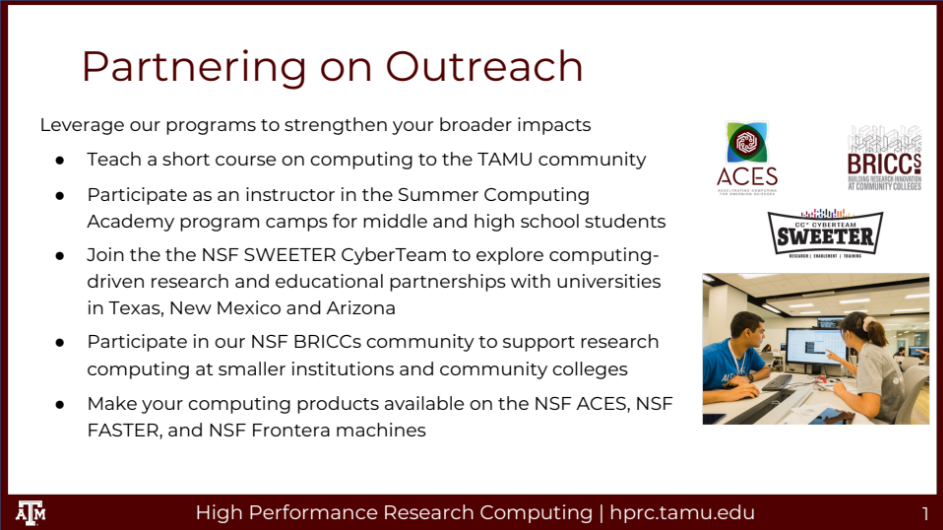
Partnering on Outreach
Leverage our programs to strengthen your broader impacts
- Teach a short course on computing to the TAMU community
- Participate as an instructor in the Summer Computing Academy program camps for middle and high school students
- Join the the NSF SWEETER CyberTeam to explore computing-driven research and educational partnerships with universities in Texas, New Mexico and Arizona
- Participate in our NSF BRICCs community to support research computing at smaller institutions and community colleges
- Make your computing products available on the NSF ACES, NSF FASTER, and NSF Frontera machines
ACES | Accelerating Computing For Emerging Sciences
BRICCS | Building Research Innovation at Community Colleges
CC CYBERTEA SWEETER | Research | Enablement | Training
High Performance Research Computing | hprc.tamu.edu
Texas A&M High Performance Research computing offers outreach programs that support computing at K-12, undergraduate and professional levels. Our Summer Computing Academy program organizes computing camps for middle and high school students. These camps offer a mix of data sciences, cybersecurity and cloud computing. Faculty are welcome to teach and participate in these camps. We lead the SWEETER (SouthWest Expertise Exchange in Training Engagement and Research) CyberTeam that was funded by the National Science Foundation. SWEETER expands to several universities across Texas, New Mexico and Arizona. The SWEETER CyberTeam helps advance cyberinfrastructure resources via a model of shared resources. BRICCs (Building Research Innovation at Community Colleges) is a NSF-funded community-building program that aims to bring advances in cyberinfrastructure to smaller universities and community colleges. BRICCs recently hosted a community workshop at South Plains College in Levelland, TX. These collaborative programs offer platforms to engage with researchers at other schools or include dissemination mechanisms.
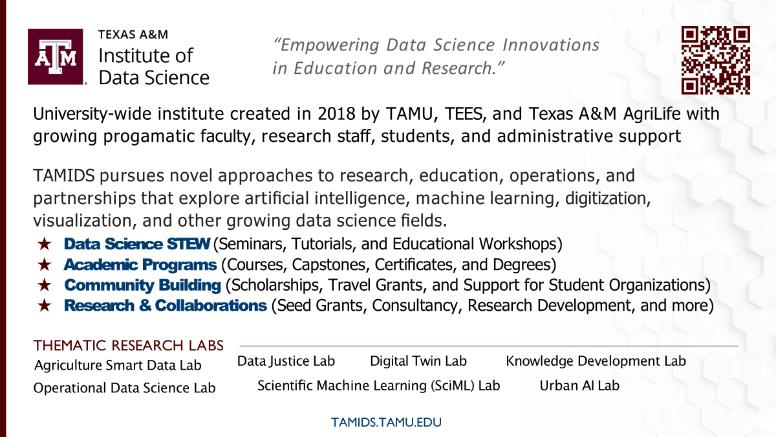
Texas A&M Institute of Data Science
“Empowering Data Science Innovations in Education and Research”
University-wide institute created in 2018 by TAMU, TEES, and Texas A&M AgriLife with growing progamatic faculty, research staff, students, and administrative support
TAMIDS pursues novel approaches to research, education, operations, and partnerships that explore artificial intelligence, machine learning, digitization, visualization, and other growing data science fields.
- Data Science STEW (Seminars, Tutorials, and Educational Workshops)
- Academic Programs (Courses, Capstones, Certificates, and Degrees)
- Community Building (Scholarships, Travel Grants, and Support for Student Organizations)
- Research & Collaborations (Seed Grants, Consultancy, Research Development, and more)
Thematic Research Labs
- Agriculture Smart Data Lab
- Data Justice Lab
- Digital Twin Lab
- Knowledge Development Lab
- Operational Data Science Lab
- Scientific Machine Learning (SciML) Lab
- Urban AI Lab
tamids.tamu.edu
The Texas A&M Institute of Data Science (TAMIDS) pursues novel approaches to research, education, and partnerships that explore artificial intelligence, machine learning, digitalization, visualization, and other growing data science fields. The Institute’s network of over 1,000 undergraduate and graduate students, hundreds of researchers and faculty members, and partners nationwide provides access to a growing community of data science experts and professionals. TAMIDS helps students acquires skills and expertise in data science through education, training, and research opportunities. It builds interdisciplinary collaborative research projects that cross disciplines. The Institute also supports operations and programs throughout Texas A&M University.
Texas A&M University Education Research Center (ERC) studies major issues in education reform and school governance. The mission of the ERC is to investigate these issues in order to inform educational policy, facilitate decision-making, and improve student learning. In support of its mission, the ERC conducts research in three areas: a) program evaluation; b) STEM education; and c) educator preparation.
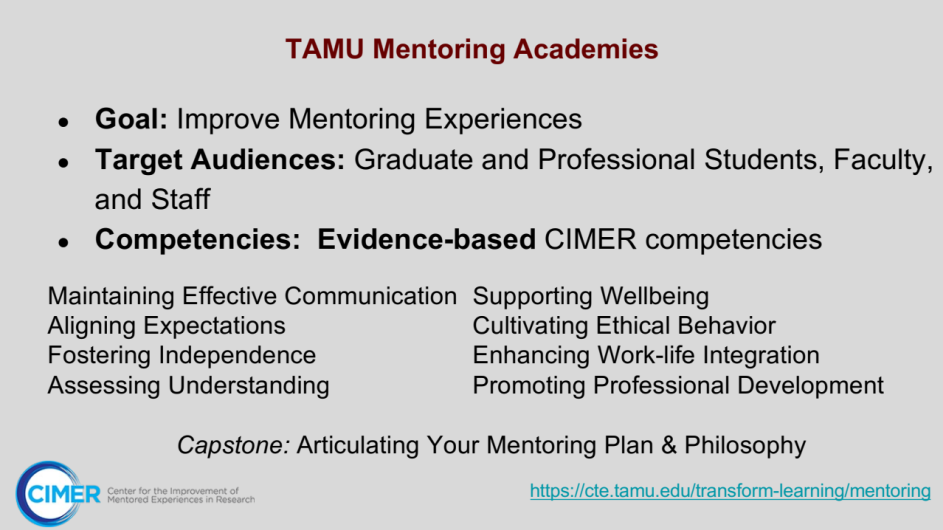
TAMU Mentoring Academies
- Goal: Improve Mentoring Experiences
- Target Audiences: Graduate and Professional Students, Faculty, and Staff
- Competencies: Evidence-based CIMER competencies
- Maintaining Effective Communication
- Supporting Wellbeing
- Aligning Expectations
- Cultivating Ethical Behavior
- Fostering Independence
- Enhancing Work-life Integration
- Assessing Understanding
- Promoting Professional Development
- Capstone: Articulating Your Mentoring Plan & Philosophy
- CIMER | Center for the Improvement of Mentored Experiences in Research
- https://cte.tamu.edu/transform-learning/mentoring
The TAMU Mentoring Academy is actually part of the larger Culture of Mentoring initiative at Texas A&M, a multi-pronged collaboration between the Center for Teaching Excellence, Graduate and Professional School, The Office of the Provost, and the Division of Research. Designed for faculty, graduate and professional students, staff, and postdocs, the TAMU Mentoring Academies are anchored in evidence-based mentoring competencies. The competencies and accompanying curriculum are developed by CIMER, the Center for the Improvement of Mentored Experiences in Research and is widely considered as the exemplar in mentorship development. You can see a list of the competencies, including the Capstone Session. Facilitators iterate and adapt the activities and scenarios for our various campus contexts. Upon completion, participants become a Mentoring Fellow and faculty receive a co-signed letter from Faculty Affairs, the Grad School, and CTE. The Academy is ongoing, Spring, Summer, and Fall – so we encourage engagement when you are available or interested. Sessions are highly interactive, typically 90 minutes, and delivered either virtually or face-to-face. These are customizable training and development opportunities and relevant for all higher education levels and affinity groups.
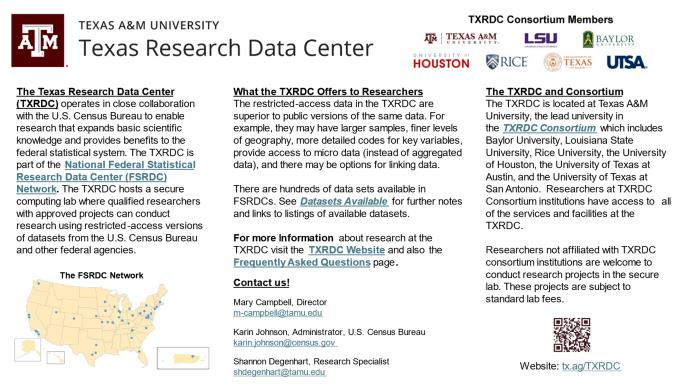
Texas A&M University
Texas Research Data Center
TXRDC Consortium Members
Texas A&M University
Louisiana State University
Baylor University
University of Houston
RICE
The University of Texas at Austin
UTSA
The Texas Research Data Center (TXRDC) operates in close collaboration with the U.S. Census Bureau to enable research that expands basic scientific knowledge and provides benefits to the federal statistical system. The TXRDC is part of the National Federal Statistical Research Data Center (FSRDC) Network. The TXRDC hosts a secure computing lab where qualified researchers with approved projects can conduct research using restricted-access versions of datasets from the U.S. Census Bureau and other federal agencies.
[Map of the USA titled “THE FSRDC Network” with dots in multiple states]
What the TXRDC Offers to Researchers
The restricted-access data in the TXRDC are superior to public versions of the same data. For example, they may have larger samples, finer levels of geography, more detailed codes for key variables, provide access to micro data (instead of aggregated data), and there may be options for linking data.
There are hundreds of data sets available in FSRDCs. See Datasets Available for further notes and links to listings of available datasets.
For more information about research at TXRDC visit the TXRDC Website and also the Frequently Asked Questions page.
Contact Us!
Mary Campbell, Director
m-campbell@tamu.edu
Karin Johnson, Administrator, U.S. Census Bureau
karin.johnson@census.gov
Shannon Degenhart, Research Specialist
shdegenhart@tamu.edu
The TXRDC and Consortium
The TXRDC is located at Texas A&M University, the lead university in the TXRDC Consortium which includes Baylor University, Louisiana State University, Rice University, the University of Houston, the University of Texas at Austin, and the University of Texas at San Antonio. Research at TXRDC Consortium institutions have access to all of the services and facilities at the TXRDC.
Researchers not affiliated with TXRDC consortium institutions are welcome to conduct research projects in the secure lab. These projects are subject to standard lab fees.
Website: tx.ag/TXRDC
The Texas Research Data Center operates in close collaboration with the U.S. Census Bureau to enable research that expands basic scientific knowledge and provides benefits to the federal statistical system. The TXRDC is part of the national RDC network and is one of many research facilities located at leading research institutions around the United States. The TXRDC serves Texas and the nation by hosting a secure computing lab where qualified researchers with approved projects can conduct research using restricted-access versions of important datasets maintained by the U.S. Census Bureau and other federal agencies. The TXRDC is located at Texas A&M University, the lead university in the TXRDC Consortium which includes the Texas A&M University System, Baylor University, Louisiana State University, Rice University, the University of Houston, the University of Texas at Austin, and the University of Texas at San Antonio.
Texas Sea Grant is a partnership with NOAA, the state of Texas, and universities across the state whose mission is to improve the understanding, wise use, and stewardship of Texas coastal and ocean resources. To achieve this mission, Texas Sea Grant funds research and provides engagement programs to benefit the people, businesses, and communities of Texas. Texas Sea Grant also deploys extension professionals into Texas coastal communities to support conservation resiliency, economic development, and STEM education efforts.
Founded in 1993, Texas Target Communities (TxTC) is an initiative between the Office of the President and the School of Architecture at Texas A&M University. TxTC provides technical assistance to small, under-served communities across the state and focuses on holistic efforts to address a host of challenges (i.e., civic, environmental, economic, etc.) encountered by communities today. TxTC facilitates networking between faculty at Texas A&M University System campuses and communities through engaged research and service-learning projects. Additionally, TxTC staff can provide expertise in relationship building, meeting design, facilitation, and methods to achieve greater community participation.
The Transformational Teaching and Learning Conference (TTLC) creates an environment in which instructors at Texas A&M University can learn, reflect, celebrate, and reset their teaching mindset and goals. This year’s conference will be held on the College Station campus April 30 – May 1. This two-day event includes invited plenary sessions, interactive participant-driven facilitated sessions, a theme-inspired plenary workshop, and concurrent in-person presentations by faculty.
The Undergraduate Summer Research Grant (USRG) funds a 10-week immersive research and professional development experience held each summer at Texas A&M University in College Station, Texas. The program is sponsored by the College of Engineering and a multitude of our departments take part in the program each year. The program’s goal is for each student to gain tangible research lab experience by working directly with faculty mentors. Students also further develop their professional acumen through a series of provided workshops and lecture series.
The goal of the program is to assist the United States Department of Agriculture (USDA) Agricultural Research Service (ARS) to reach out to communities, schools (grades K thru12) and undergraduate students. There are over 80 USDA/ARS research laboratories nationwide and they want to make themselves accessible as educational outreach resources for teachers. One component of the program is to invite teachers to attend two-day summer institutes held at their local USDA/ARS laboratory or research center to become directly involved in that research. The teachers can then engage their students in that research. This program is also looking to collaborate with faculty to develop a new program related to research experiences for undergraduates in the Life Sciences.
